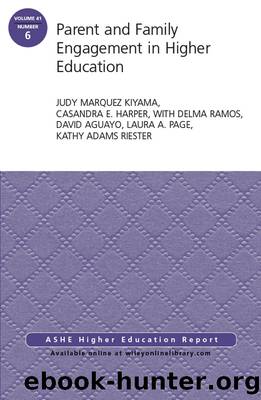Parent and Family Engagement in Higher Education by unknow

Author:unknow
Language: eng
Format: epub
ISBN: 9781119205678
Publisher: John Wiley & Sons, Incorporated
Published: 2015-09-21T00:00:00+00:00
This highlights one example of an exception to the assumed independence from parents that students are otherwise assumed to have upon matriculation.
On average, there are 3 short months between high school graduation and first-year move in day; it is understandable that parents of 17â18-year-old students are challenged by this quick transition of power. For students and parents coming directly from the secondary education experience, college offers some autonomy and accountability, but not yet the level of what is expected later in life (Pickard, 2011). Once a student is considered a legal adult, federal law transfers the rights of parents to students, making it more difficult to share information with parents and family members (Weeks, 2001). The drastic change from an educational entity fully supporting and expecting involvement to families receiving little to no information comes with no explanation and at times, little empathy from higher education institutions.
FERPA remains a barrier in terms of how institutions communicate with parents and families, and is often misunderstood by not only students and their families, but the campus staff who are charged in upholding its tenets. Contributing to this challenge is that FERPA policies and implementation are typically housed in a different location on campus than parent and family services. Because of FERPA's relationship with student records, the Registrar is the campus resource for the policy at most institutions (American Association of Collegiate Registrars and Admissions Officers [AACRAO], n.d., FERPA section). On the other hand, parent and family services most frequently report to Student Affairs (Savage & Petree, 2013). Staff who work specifically with parents and families are committed to helping them understand their role in promoting student success, and often find themselves interpreting and explaining FERPA to colleagues campus-wide. Just as institutions have responsibilities to students in terms of educating them on campus resources, we must begin to question if institutions have a similar responsibility to educating staff with the goal of better supporting parents and families. Henning (2007) suggested institutions consider a new framework to guide their relationships with students, parents, and family members:
In consortio cum parentibus, translated as âin partnership with parents,â is a model that can be used to define the current relationship between colleges, traditional-aged college students, and parents and guide the work of student affairs professionals, including policy implementation, program development, and student interactions. (p. 551)
Download
This site does not store any files on its server. We only index and link to content provided by other sites. Please contact the content providers to delete copyright contents if any and email us, we'll remove relevant links or contents immediately.
The Art of Coaching Workbook by Elena Aguilar(48572)
Trainspotting by Irvine Welsh(20141)
Twilight of the Idols With the Antichrist and Ecce Homo by Friedrich Nietzsche(17754)
Fangirl by Rainbow Rowell(7893)
Periodization Training for Sports by Tudor Bompa(7376)
Change Your Questions, Change Your Life by Marilee Adams(6702)
This Is How You Lose Her by Junot Diaz(5845)
Grit by Angela Duckworth(4778)
Red Sparrow by Jason Matthews(4734)
Asking the Right Questions: A Guide to Critical Thinking by M. Neil Browne & Stuart M. Keeley(4643)
Paper Towns by Green John(4209)
Room 212 by Kate Stewart(4152)
Ken Follett - World without end by Ken Follett(4003)
The Sports Rules Book by Human Kinetics(3630)
Housekeeping by Marilynne Robinson(3456)
The Motorcycle Diaries by Ernesto Che Guevara(3380)
Introduction to Kinesiology by Shirl J. Hoffman(3329)
Exercise Technique Manual for Resistance Training by National Strength & Conditioning Association(3329)
Papillon (English) by Henri Charrière(3324)
